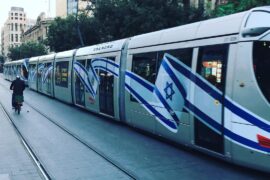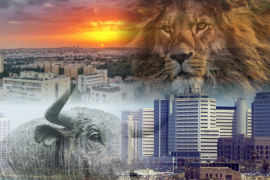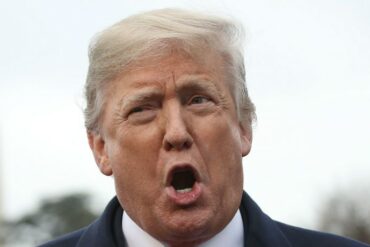Parshat Bo shows the Hebrews being given a series of commandments to help develop a national consciousness ahead of the Exodus.
Why was the establishment of a Hebrew calendar the first commandment given to Israel as a nation?
What can the wealth Israel took out of Egypt teach us about incorporating foreign ideas into our society?
In what way were t’fillin a sign of Hebrew victory over Egypt?
“The Hebrew Identity” podcast draws upon teachings from Manitou (Rav Yehuda Ashkenazi), Rav Kook, and many of Israel’s ancient sages to present the evolving story of the Hebrew tribes, as seen in the weekly Torah portion. The series focuses on what the unique challenges and personal growth of various Biblical personalities can teach us about our present day struggles.
For more content from VISION Magazine, subscribe to our newsletter and follow us on Twitter @VISION_Mag_, Facebook and YouTube. If you haven’t already, don’t forget to subscribe to our podcast on SoundCloud, iTunes, Stitcher, TuneIn, or Spotify and leave a rating and review to help us get our message out to a wider audience!
To support the podcast, head over to our PayPal portal and be sure to write a note that your contribution is for the podcast.
Hosted by: Yehuda HaKohen
Transcript:
The central theme of Parshat Bo is the national consciousness developing within Israel. We saw last week that Parshat Va’eira focuses on the conflict between Moshe and Pharaoh and emphasizes the educational process taking place in Egyptian society. Egypt was the most highly developed civilization of that time and domestic Egyptian issues had a ripple effect on the international community. That’s one of the reasons Israel’s national birth had to come out of Egypt specifically – so that the entire world could learn and advance as a result of the event.
Parshat Bo refocuses on Israel and on the transformation taking place for the Hebrew slaves – who have suddenly become aware of themselves as a distinct national identity separate from the dominant Egyptian society.
In Sh’mot 10, verse 1, the parsha opens with HaShem telling Moshe “Bo el Pharaoh” – “go to Pharaoh.” The name Bo also alludes to the idea that Israel had to descend to Egypt in order to extract from it the Divine sparks that would become part of our national identity and spiritual DNA.
HaShem also told Moshe that He had hardened Pharaoh’s heart. As we discussed in our last episode, this hardening didn’t strip Pharaoh of agency but actually gave him more freedom of choice by strengthening him to withstand the pressure and fear brought on by the plagues.
The primary goal of the plagues wasn’t to punish or coerce the Egyptian ruler but actually to change his understanding of the world in order to elevate the consciousness of all humanity.
Pharaoh ruled Egypt, both politically and culturally, at a time when Egypt was at the center of human civilization. Egyptian experiences and ideas would determine the future course of history’s development. So Pharaoh’s decisions had ramifications that extended far beyond the territory he controlled.
The plagues were therefore a protracted reeducation process designed to gradually change Pharaoh’s understanding of the world and help him and all humanity to recognize HaShem as the timeless ultimate Reality without end that creates all, sustains all, empowers all and loves all.
So while on the surface, the conflict between Moshe and Pharaoh appears to have been about the monarch’s willingness to emancipate the Hebrew slaves, Manitou teaches us that it was also about establishing Israel in place of Egypt as the central character of history – as the national foundation for human civilization’s further development.
This conflict has actually recurred several times in Israel’s story. The four empires that would later derive from Egypt – namely Babylon, Persia, Greece and Edom – each formed civilizations that attempted to claim Israel’s role on the world stage. Even modern attempts to limit the scope of Israel’s rebirth and independence by the United States – which is itself the current manifestation of the fourth empire – comes down to a deep subconscious desire to maintain its global hegemony. Not only its economic and political dominance but also its ideological dominance. We learned in our episode on Parshat Toldot that Israel and Edom can’t coexist as world powers. When one rises the other must fall.
Ahead of the eighth plague, the plague of locusts, the dispute between Moshe and Pharaoh reached a new height. After informing the king and his court that an unnatural swarm of locusts would devour Egypt’s remaining food supply, Sh’mot 10, verse 6 shows us Moshe storming out of the throne room – something that indicates a breakdown in relations.
In verse 7, we see Pharaoh’s advisors plead with their king to reconsider his position, crying that Egypt is lost. This should be understood as not merely Egypt’s material destruction but also the loss of its leadership role in human development.
Pharaoh then ordered that Moshe and Aharon be brought back, which should be understood as a response to Moshe’s earlier expression of disrespect. But despite the deteriorating personal relationship, Pharaoh expressed a willingness to give in to Moshe’s demands. But as soon as Pharaoh allowed for Israel to go serve HaShem as earlier requested, Moshe changed his position.
Until this point, Moshe had been framing his demands to Pharaoh in the language of a religious ritual. But once the monarch had given in to that demand, Moshe stated that all the Hebrews and all their property must go, implying that this would be a permanent national departure.
Pharaoh was outraged by Moshe’s increased demand and its implications. Before having Moshe and Aharon forcibly removed from his presence, the monarch demanded that they return to their former position.
But after the locusts brought Egypt to the brink of starvation, Pharaoh summoned the brothers – this time respectfully – and confessed his guilt, which demonstrates an advancement in his worldview. But in Sh’mot 10, verse 20, we see again that HaShem strengthened Pharaoh to overcome his fear and act according to his intellectual understanding, which had not yet completed its necessary transformation.
The ninth plague, the plague of darkness, served a different educational function than the previous plagues and there wasn’t any need for Moshe to deliver an advance warning. For three days, the country was struck with a thick dark fog that isolated each Egyptian and provided them with time to think. During this time, each individual was given a chance to choose whether to side with Moshe or Pharaoh.
Following the darkness, Pharaoh summed Moshe for the last time. What’s unique here is that Pharaoh wasn’t summoning Moshe in order to stop a plague. The plague had already ended. After three days of being alone with his thoughts in the dark, Pharaoh had decided to almost completely give in to Moshe’s demands. His only caveat was that he wanted Israel’s livestock to remain in Egypt so that the Hebrews would be forced to return.
Moshe responded in Sh’mot 10, verse 25 that even Pharaoh himself would provide animals to Israel. And in the next verse he clarified that the Hebrews would be taking all of their livestock with them. But in order to offer Pharaoh the opportunity to save face, Moshe once again framed his argument in religious rather than nationalist terms.
Pharaoh still wasn’t ready to set Israel free so HaShem once again strengthened him to overcome his fears and the pressure of Egypt’s devastation and not only order Moshe to leave his palace but also to threaten him with death if he ever tried to return. In the literal sense, we can understand this as Pharaoh not wanting to see Moshe again.
But Manitou teaches us to understand this statement on a deeper level as telling Moshe that Israel had already gathered all the sparks of holiness that existed in Egypt. The Hebrews had already absorbed into ourselves the elements of Egyptian civilization that would be necessary to integrate into our identity in order to construct Malkhut Yisrael. And all the Egyptians who would decide to join Israel had already done so. Any further assimilation of Egyptian culture into Hebrew identity would be harmful at this point.
Moshe then expressed agreement with Pharaoh’s statement and told the Egyptian ruler in Sh’mot 10, verse 29 that he wouldn’t see him again. The Ramban understands this to mean that Moshe would never again visit Pharaoh in his palace. But then in Sh’mot 11, verse 1, before Moshe could even leave the king’s presence, he received nevua right there on the spot.
This was the only time Moshe received prophecy in the presence of Pharaoh. This was for the sake of informing the king of the final plague during that encounter. Following his prophetic experience, which also included instructions for Israel’s departure, Moshe told Pharaoh that the firstborn sons of Egypt would die.
This final plague was significant, not only because it inflicted death on the individual firstborn of each Egyptian family but also because it signaled the death of Egypt itself as the firstborn of humanity. It ended Egypt’s reign as the dominant power on the international stage.
Sh’mot 11, verse 8 tells us that after Moshe finished informing the king of the final plague, he left Pharaoh’s presence in a burning anger.
Although the Torah doesn’t specify the reason for his anger, it’s possible that Moshe – having been raised an Egyptian prince – may have still had some nostalgic sympathy for the kingdom and was hoping that Pharaoh would repent and avoid Egypt’s destruction. The fact that Pharaoh was cutting off communication essentially made further dialogue impossible and necessitated Egypt’s subsequent devastation.
In Sh’mot 12, verse 2, we see HaShem instructing Moshe and Aharon how to establish the Hebrew calendar. This was essentially the first commandment that Israel received as a nation and it was important for establishing Israel as an independent identity. A national calendar is a crucial feature of any civilization.
We can see this from the fact that when the Syrian-Greek King Antiochus IV later tried to destroy our identity, one of the laws he passed alongside banning circumcision, Shabbat and learning Torah was the banning of our calendar. This alone should demonstrate how important a calendar is to a national identity. Its festivals tell a people its own story and reinforce its basic common values and worldview.
Israel received our calendar two weeks before actually leaving Egypt because part of our liberation required us to stop using the Egyptian calendar and to start using a uniquely Hebrew calendar that would become central to our identity until today.
The shift from using the Egyptian calendar to using our own accelerated Israel’s transformation to a people that saw itself as distinct and completely independent from Egypt.
Manitou teaches that the uniqueness of the Hebrew calendar actually reveals a lot about Israel’s place in the world. The Egyptians used a solar calendar that would later be adopted by the Greco-Roman world, Christianity and ultimately all of Western civilization.
Babylon at this time used a lunar calendar, which would later be adopted by the Islamic world. Israel received a calendar that’s both lunar and solar, which integrates features of both major civilizations and reflects Israel’s role as a bridge between them.
But it should be noted that Israel’s calendar is actually not an equal synthesis of lunar and solar. It’s actually primarily lunar with minimal solar adjustments to ensure that the seasons for the most part remain in the same place each year.
So although it’s true that Israel can be seen as a bridge between the Christian West and the Islamic East, we actually share more in common with one side than the other.
In any case, the Hebrew calendar, together with its festivals and national days of mourning, contributed to establishing a collective identity with a shared memory and perception of the world. In addition to psychologically distancing Israel from the Egyptian ideology, it also oriented the Hebrews towards realizing our universal role among the nations of the world, by serving as the bridge between civilizations.
In Sh’mot 12, verse 3, Moshe was commanded to address himself to the Hebrews. So long as the first nine plagues were taking place, Moshe didn’t speak to Israel in any official capacity. He had been giving the Hebrews space to experience an internal transformation and develop national consciousness. But now the time had come to translate national consciousness into action.
Moshe was commanded to instruct Israel in the laws of Pesaḥ and those of the seder, including the mitzva to take a lamb on the tenth of the month and hold it for four days until it would be slaughtered on the fourteenth as part of the seder each family would participate in on the night before leaving Egypt.
This was an especially important part of Israel’s liberation because lambs were seen as deities by the Egyptian population and through making public demonstrations of killing Egyptian gods, the Hebrews were overcoming an inner sense of slavery by participating in an act of collective defiance against their former masters.
The plague against the firstborn took place on the seder night. From the firstborn of Pharaoh to the firstborn of prisoners and even cattle.
There was a great cry throughout Egypt. And Pharaoh met with Moshe and Aharon in the middle of the night. He acknowledged Israel as a distinct national identity, ordered them to immediately leave Egypt and even requested that they bless him. This request for a blessing should be understood as acknowledging that Israel was replacing Egypt as the main character of history. This acknowledgment of Israel’s centrality was a significant advancement from Pharaoh’s earlier unwillingness to even recognize the Hebrew slaves as a distinct people separate from Egypt. But despite Pharaoh’s order that the Hebrews leave right away, Israel waited until morning to depart in broad daylight.
In Sh’mot 12, verse 35 we see the children of Israel carrying out the word of Moshe by requesting silver, gold and garments from the Egyptians. This was in fulfillment of HaShem’s instruction to Moshe in chapter 11, verse 2. And verse 3 there tells us that HaShem disposed the Egyptians favorably toward the Hebrews.
The transfer of a substantial portion of Egypt’s wealth to Israel had both material and spiritual importance. From a material perspective, it was payment for centuries of slave labor and for the homes Israel would leave behind. And from a spiritual perspective, Israel had to take the wealth of Egyptian culture and civilization, in order to later integrate it into the Hebrew society that would need to be established in the Land of Israel.
The material understanding can also serve as a metaphor for the spiritual understanding. Manitou points out that some of the gold Israel took from Egypt would later be used to construct the Mishkan while some of it would be used to construct the Golden Calf.
When we take aspects of other people’s cultures or values, it’s necessary for us to sift in order to determine which are or aren’t beneficial for us. This has been an especially challenging question in modern times with Jews returning home from countries all over the world. What gold from the lands of our exile do we bring with us and incorporate into our state and what gold do we discard? The filtration mechanism we use to sift the foreign gold requires a perspective of deep emuna and a clear understanding of Israel’s national mission. The more deeply we understand Israel’s purpose on the world stage, the better we can identify what aspects of foreign cultures can be beneficial versus harmful to the civilization we’re meant to build.
As Israel was leaving Egypt, together with much of the kingdom’s wealth and many Egyptians who had chosen to join the Hebrews, Moshe delivered a national address. This began with emphasizing the Exodus and the laws of its commemoration. But Moshe also made sure to emphasize the importance of the Land of Israel as the place where these laws would be carried out and where the Hebrews would actualize our national life and mission.
This was especially necessary for the Egyptians who were joining Israel at this point because most of these people had been attracted to the charismatic personality of Moshe and to the power of his God but they had no real connection to the national or territorial components of Hebrew identity. It’s even possible that these people hadn’t initially planned to leave Egypt at all but only did so because they were viewed as traitors by their fellow Egyptians and therefore had no choice but to leave together with Israel.
In Sh’mot 13, verse 9, we see Moshe mentioning a sign Hebrew men would wear on our arms and a remembrance of the Exodus between our eyes. And then in verse 16, we see Moshe say that “it shall be a sign upon your arm, and an ornament between your eyes, for with a strong hand HaShem removed us from Egypt.”
The word the verse uses for “ornament” is “totafot” – which doesn’t seem to have any root in the Hebrew language. Manitou presents one explanation of this word as “that which is a replacement for the god Thoth.” The traditional headdress of Pharaoh featured a uraeus – a figurine of a cobra mounted on the forehead as a symbol of wisdom associated with the idol Thoth.
The snake, which coils itself into circles without any straight lines or sharp angles, was a symbol of the amoral Egyptian ideology. In our Kabbalistic teachings, the circle is symbolic of nature, which possesses no inherent purpose or direction. The totafot that Hebrews wear on roughly the same part of the head as the uraeus are leather boxes containing excerpts from the Torah. They must be square in shape, with sharply delineated right angles. Straight direct lines symbolizing Divine Providence, morality and purpose.
The Kabbalistic teachings understand these straight lines as rays of light. And when the straight rays of the totafot replaced the circular cobra on Pharaoh’s head, that symbolized the triumph of Israel over Egypt and the triumph of the belief in moral imperatives and higher purpose over the amoral cycles of nature that had characterized the Egyptian understanding of reality.
The Torah here presents the t’fillin not only as having ritual and spiritual value but also as having national value as a sign that commemorates Israel’s victory over Egypt.





